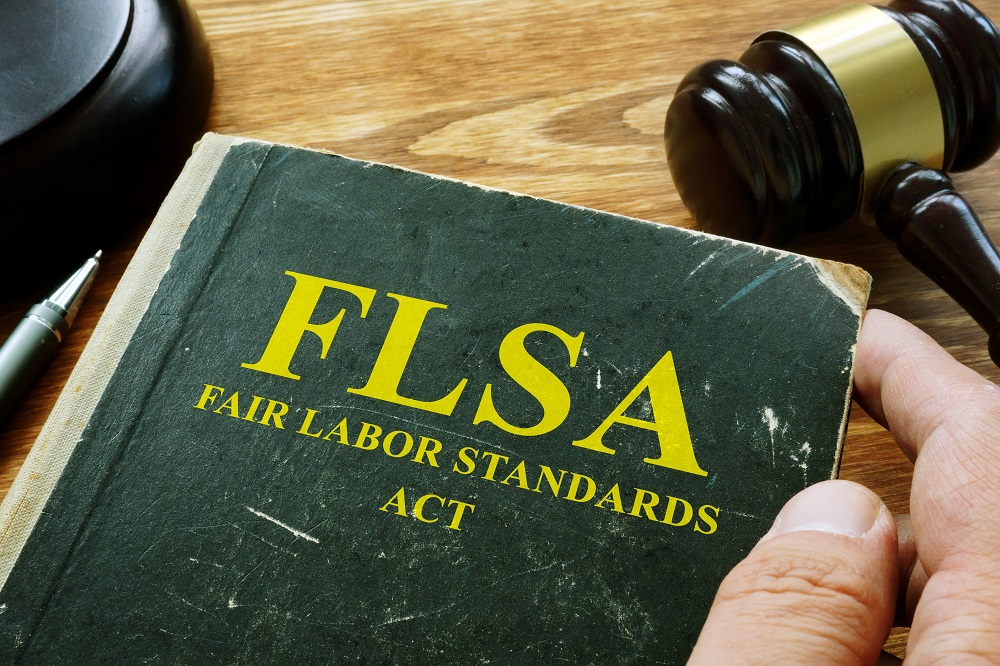Established in 1938, the Fair Labor Standards Act (FLSA) supports American labor law by protecting workers’ rights and ensuring they’re treated fairly in their workplaces. It has impacted American labor by setting standards for minimum wage, overtime pay, child labor, and recordkeeping requirements at the federal level.
This article will discuss some of these key areas, looking at how the FLSA establishes a minimum wage, mandates overtime pay for eligible workers, regulates the employment of minors, and requires employers to maintain detailed records of employees’ hours worked and earned wages. These components combine to promote fair labor practices and economic security for workers in various sectors.
Overview of the Fair Labor Standards Act
The Fair Labor Standards Act was enacted in 1938 as a federal law protecting workers by setting minimum wage and overtime pay standards, as well as other labor practices. Its main goals were to eliminate labor conditions reducing conditions below a minimum standard of living necessary for the health, efficiency, and general well-being of workers. The FLSA applies to employees in both private and government sectors, maintaining a standard of fair compensation and labor conditions across various workplaces. The FLSA has also seen several amendments to broaden its coverage and align it with changing economic conditions.
Minimum Wage
The federal minimum wage has been $7.25 per hour since July 24, 2009, although many states have their own higher minimum wage laws that align with more local economic conditions. When federal and state rates interact, employers must adhere to the higher wage rate where applicable, so workers get the best minimum wage available. The Fair Labor Standards Act also includes provisions for wages under the federal minimum in exceptions such as the youth minimum wage, which permits employers to pay employees under 20 years old a minimum of $4.25 per hour during their first 90 consecutive days of employment, and wages for disabled workers, enabling them to be paid at rates below the federal minimum under specific conditions.
Overtime Pay
The Fair Labor Standards Act dictates that eligible employees must receive overtime pay at a minimum rate of one and one-half times their regular pay for any hours worked beyond 40 in one workweek. Significant updates have been introduced and will go into effect on July 1st, 2024, including raising the salary threshold of overtime eligibility from $35,568 to $43,888 annually, with another increase to $58,656 scheduled for January 1, 2025. These changes are meant to extend overtime protections to millions more workers. However, the FLSA also precisisely describes certain exemptions, mainly for executive, administrative, and professional (EAP) employees, who are not entitled to overtime pay if they meet certain criteria related to their work duties and salary.
Child Labor
Also included in the Fair Labor Standards Act are strict regulations for maintaining the educational opportunities and well-being of minors, also keeping them from working in hazardous occupations. These provisions ensure that work doesn’t get in the way of a minor’s education or risk their health and safety. The FLSA specifies the types of work and conditions for minors can work in: 14- and 15-year-olds can work outside school hours in non-manufacturing, non-hazardous jobs for limited hours, while 16- and 17-year-olds can work any non-hazardous job for unlimited hours. Additionally, work in certain industries, such as agriculture, have specific rules for allowing minors of different ages and the conditions they can work in, striking a balance between the minors gaining valuable work experience while maintaining their educational opportunities.
Recordkeeping Requirements
The Fair Labor Standards Act saddles employers with specific recordkeeping requirements, mandating them to maintain precise records of employees’ time and pay. Employers must keep detailed records of employee data, hours worked each day, total hours worked each week, regular hourly pay rates, total daily or weekly straight-time earnings, and total overtime earnings for the workweek. These records ensure adherence to the FLSA, since they demonstrate compliance with minimum wage and overtime pay regulations. This way, they prevent disputes and streamline audits by the Department of Labor. Accurate recordkeeping is vital for legal compliance but also for keeping transparency and trust in the workplace.
Recent and Upcoming Changes
Significant recent changes have been made to the Fair Labor Standards Act, mainly in overtime pay rules. As of July 1, 2024, the salary threshold for overtime eligibility will rise from $35,568 to $43,888 annually, with a further increase to $58,656 on January 1, 2025. Additionally, on July 1, 2027, salary thresholds will see periodic adjustments to reflect current wage data, ensuring their relevance and fairness in the future. These adjustments extend overtime protections to millions more workers, so they are fairly compensated for their labor. For workers, these changes provide greater financial security and recognition for going above and beyond. For employers, it means adjustments in payroll management must be made labor costs might increase. However, these changes also promote fairer labor practices and improve employee satisfaction and retention.
The Impact of the Fair Labor Standards Act
The Fair Labor Standards Act safeguards fair labor practices across the United States, providing essential protections like minimum wage, overtime pay, and child labor standards. This way, it fosters a work environment where employees are fairly compensated and safe from exploitation.
In the future, current debates surrounding the FLSA are guiding its future. Issues like minimum wage rate adjustments, expansions of coverage to gig economy workers, and adaptations to changing work arrangements in the face of technological advancements remain core focuses. As society sees economic shifts and changing workforce demographics, the FLSA remains important in ensuring equitable treatment for all workers.




